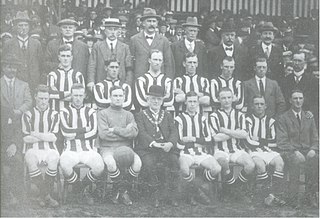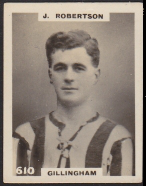Related Research Articles

Gillingham Football Club is a professional association football club based in the town of Gillingham, Kent, England. The only Kent-based club in the Football League, the "Gills" play their home matches at Priestfield Stadium. The team compete in League Two, the fourth tier of the English football league system, in the 2022–23 season.

Gillingham Football Club is an English football club based in Gillingham, Kent. The club was formed in 1893, and played in the Southern League until 1920, when that league's top division was absorbed into the Football League as its new Division Three. The club was voted out of the league in favour of Ipswich Town at the end of the 1937–38 season, but returned 12 years later, when that league was expanded from 88 to 92 clubs. Twice in the late 1980s Gillingham came close to winning promotion to the second tier of English football, but a decline then set in and in 1993 the club narrowly avoided relegation to the Football Conference. In 2000, the "Gills" reached the second tier of the English league for the first time in the club's history and went on to spend five seasons at this level, achieving a club record highest league finish of eleventh place in 2002–03. The club has twice won the division comprising the fourth level of English football: the Football League Fourth Division championship in 1963–64 and the Football League Two championship in 2012–13.
James Boswell was an English professional footballer. He played for Gillingham from 1946 until 1958, making 342 appearances in the English Football League, and appeared in more FA Cup matches than any other player in the club's history.

James Walter "Jock" Robertson was an English association footballer who played professionally for Gillingham. He joined the club while it was still playing non-league football and went on to set a club record for the most matches played in the Football League, making over 350 appearances.
During the 1920–21 English football season, Gillingham F.C. competed in the Football League for the first time. The team had previously played in Division One of the Southern League, but in 1920 the Football League added the Third Division to its existing set-up by absorbing the entire Southern League Division One. The club appointed Robert Brown as manager, but the arrangement turned out to be only a casual one and he accepted another job before the season started. Under his replacement, John McMillan, Gillingham's results were poor, including a spell of over three months without a league victory, and at the end of the season they finished bottom of the league table.
James Harold Poxton was an English professional footballer of the 1920s and 1930s. Born in Staveley, he joined Gillingham from West Bromwich Albion in 1928 and went on to make 43 appearances for the club in The Football League. He left to join Millwall in 1929. He subsequently played for Watford – predominantly at outside left – and Walsall.

Charles Reddock was a Scottish professional football left half of the 1920s. Born in Rutherglen, he joined Gillingham from Shettleston in 1925 and went on to make 29 appearances for the club in The Football League. He left to join Brentford in 1926 and made 9 appearances in a four-year spell, before finishing his career with Thames.
James S. McWhirr was a Scottish professional footballer of the 1920s who played as an outside right. Born in Partick, he joined Gillingham from Glasgow-based club Ashfield in 1925 and went on to make six appearances for the club in the English Football League. He left to join Norwich City in 1926.
Francis Edward Taylor was an English professional footballer of the 1920s.
Alfred Young was an English professional association football player of the 1920s.
Trevett William Read was an English professional footballer. He joined Gillingham in 1919 as a goalkeeper after serving in the Royal Navy and made two appearances in the Southern League in the 1919–20 season. After the club was elected to The Football League in 1920, he did not play again until he made a solitary appearance in 1924. He conceded five goals in a defeat to Millwall and never played for the club's first team again.
Amos Dee was a Welsh professional footballer of the 1920s.
Donald McCormick was an English professional footballer of the 1920s. He joined Gillingham in 1919 and played for the club in the Southern League. After the club was elected to The Football League in 1920, however, he only played once more before leaving to join Sheppey United in 1921, where he linked up with another player who had failed to make the transition to the higher level, Joseph Griffiths.
Harold "Harry" Wright was an English professional footballer of the 1920s. Born in Staveley, he joined Gillingham from Welbeck Colliery in 1920 and went on to make 33 appearances for the club in The Football League, after which he returned to the colliery team. In 1922, he joined Bradford City, where he played for five years before joining Staveley Town in November 1927.
John Mahon was an English professional footballer who played as a half back.
Abel Lee was an English professional football right half who played in the Football League for Grimsby Town and in the Southern League for New Brompton/Gillingham.
During the 1926–27 English football season, Brentford competed in the Football League Third Division South. In Harry Curtis' first season as manager, the club finished 11th and advanced to the fifth round of the FA Cup for the first time.
During the 1937–38 English football season, Gillingham F.C. competed in the Football League Third Division South, the third tier of the English football league system. It was the 18th season in which Gillingham competed in the Football League. The team won only three times in nineteen Football League matches between August and December; in November and December they played six league games and lost every one without scoring a goal, leaving them bottom of the division at the end of 1937. Although Gillingham's performances improved in the second half of the season, with seven wins between January and May, they remained in last place at the end of the season, meaning that the club was required to apply for re-election to the League. The application was rejected, and as a result the club lost its place in the Football League and joined the regional Southern League.
References
- ↑ Triggs, Roger (2001). The Men Who Made Gillingham Football Club. Tempus Publishing Ltd. p. 18. ISBN 0-7524-2243-X.
- ↑ Brown, Tony (2003). The Definitive Gillingham F.C.: A Complete Record. Soccerdata. p. 121. ISBN 1-899468-20-X.